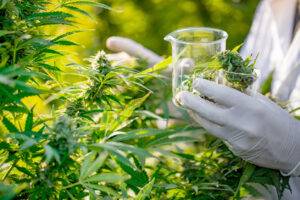Hemp and Potatoes: The Hypocrisy of Stigmas

Think for just a moment about benign agricultural staples like potatoes, corn, sugar cane, barley, and grapes. You will not get drunk eating French fries. Raisins will not make you giddy. And so, American farmers can freely tend their spuds and vineyards with a minimum of intervention from the state. Now consider that each of these innocent plants, through the magic of fermentation, can be transformed and bottled and sold at your local liquor store to anyone with a valid ID. So … are these same innocent tubers, plants, stalks, and fruits despised by god-fearing citizens who warn that the road to hell is down the produce aisle? No. In spite of their long, long, long association with alcohol production, there is no stigma here, nor should there be.
Sadly, such is not the case with hemp, despite its harmless and noble history.

In 2018, the Farm Bill re-legalized this traditional North American row crop which had been banned for decades, despite its prized role in WWII US military efforts. By the 1950s, cheaper fiber from overseas had taken over the market and hemp’s value fell. Eventually, it was consigned to Schedule 1 status under the 1970 Controlled Substances Act by legislators and regulators who didn’t know or care to understand the distinction between hemp and marijuana. But for the past five years, the curse having been lifted, eager growers rushed into hemp production with high (no pun intended) hopes.
Unfortunately, their enthusiasm was matched by that of legislators, lobbyists, regulators, and over-zealous do-gooders who were equally eager to micro-manage hemp right back to oblivion. The 2018 Farm Bill was initially lauded as a return to reason regarding hemp farming in the US. And it was. Sort of. For a while. At least it authoritatively established the distinction between hemp and marijuana … finally. And yet, to a degree, the stigma remains.
When the door was re-opened to hemp agriculture, it let in a teeming mass of conflicting interests and botanically ignorant advocates. There was not enough clear legislative or regulatory framework in place to effectively channel all this energy into constructive, progressive outcomes. The lack of structure was also an open invitation to loophole-seekers keen to make a quick buck. Safe to say, this has led to some turmoil.

Regulatory bodies including the FDA and DEA have failed to codify away the imprecision in the 2018 Farm Bill. For example, delta-8 products are now (as of February 2023) an illegal controlled substance. Unless they aren’t. It depends on whether they were synthetically produced. Maybe. Maybe not. Differs by state. Meanwhile, the FDA has stated it is not ready to create rules to allow CBD to be marketed as a food or dietary supplement. (But that Marlboro you’re smoking … not a problem. Whew.) The irony is that what gave rise to synthetic hemp cannabinoids in the first place was a lack of clear regulation. Producers took advantage of a synthetic way to derive psychoactive ingredients from legalized hemp to circumvent marijuana laws. This is exactly what a free market will do. If you’re a fan of history, the delta producers might bear a striking resemblance to the scoundrels cooking up bathtub gin to evade Prohibition. We’re no big fans of more rules, but sometimes the hemp marketplace feels like we’re playing whack-a-mole with our own government.

And that’s just the confusion around what’s legal to sell. Then there’s all the bother on the production side around the 0.3 percent threshold – a razor thin margin that has resulted in state inspectors senselessly burning thousands of acres of 0.4 and 0.5 crops. Imagine spending all that time and treasure raising up those plants, only to have them unexpectedly bolt to “hot” stage. And then you watch as an agricultural detail comes onto your farm and makes you torche your profit. The stress of that potential result hanging over your head the entire growing season has discouraged many growers.
In the private sector the battle banners have been taken up by opposing industry groups. On one side, the US Hemp Roundtable is pushing to define the FDA’s role in regulating hemp and CBD. They are also lobbying to raise the THC limit from 0.3 to 1 percent for hemp crops. In the other corner, Americans Against Legalizing Marijuana is pushing to criminalize any product that doesn’t have FDA approval. As of this writing, that would include most CBD products. It can take many years to obtain FDA approval.

It’s in the context of all this chaos and conflict that Congress is shaping the 2023 Farm Bill. The one thing that probably everyone could agree on is that there is plenty of opportunity to tidy up all the legal ambiguities and silliness around hemp agriculture. Farmers need to be freed from hair-splitting rules that defy the fundamental unpredictable nature of raising crops. Processors and producers need unequivocal regulatory policies to operate under. Retailers need clear, consistent product standards that make shopping for hemp products a safe and informed process for consumers. It should have been far less complicated for hemp to resume its safe, rightful, historic place in US agriculture. Hard to believe it’s still very much a huge, unassembled jigsaw puzzle after all this time and so much debate.

But now, we’ve got another occasion to put a few more pieces into place. In the US, we legislate a new Farm Bill every five years. Let’s hope this time around, Congress legislates away the gray areas and creates a better environment for hemp agriculture to flourish in a responsible way going forward. Just like potatoes and grapes. We only have a shot at this twice every decade. Let’s hope we get it right this time around … or at least a little closer.


Recent Comments